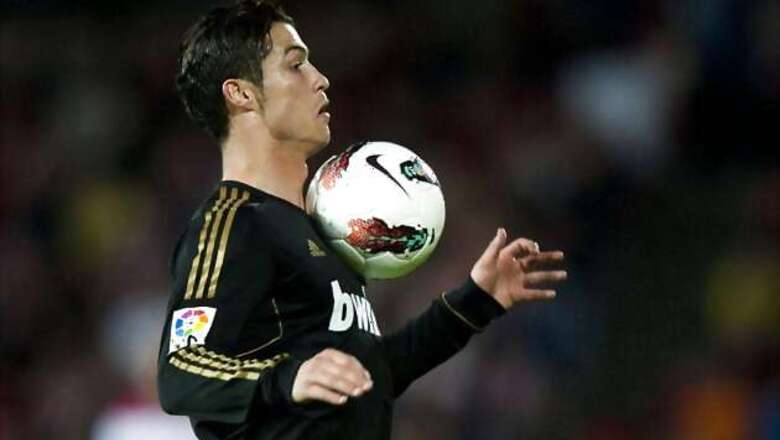
views
Gniewino: Ten Real Madrid players will pull on the shirts of Spain, Portugal and Germany in this week's Euro 2012 semi-finals, the latest reminder of the clout wielded by the world's richest soccer club by income.
Cristiano Ronaldo, the world's most expensive player at about $125 million, will lead Portugal's Pepe and Fabio Coentrao out against their Real team mates representing Spain in Donetsk on Wednesday, before Mesut Ozil and Sami Khedira line up for Germany against Italy in Warsaw on Thursday.
Real's economic might, and that of great domestic rivals Barcelona, the world's second richest club who have seven players in the Spanish squad, mainly derives from their stranglehold over revenue from La Liga television rights.
Their whopping TV deals, negotiated individually, allow them to buy and pay the best players and compete with European rivals like the Manchester clubs, United and City, Chelsea and Bayern Munich, while their Spanish peers are left trailing far behind.
Analysts have long argued that Spain needs to adopt the system of collective bargaining and income sharing for TV rights used in other major European leagues or else more of Spain's professional clubs will follow Real Zaragoza, Real Betis, Racing Santander and others into administration.
Real and Barca have come under some pressure to agree a fairer distribution of TV cash but analysts say a recent collective deal struck by the English Premier League, which will boost revenue by 70 percent over three years, makes it unlikely they will give up their current dominance.
The economic crisis gripping Spain and Europe has only made the need for change more urgent, while the success of the Spanish national team stands in stark contrast to the parlous financial situation in the country's domestic league.
"A majority of clubs are bankrupt," Jaume Llopis, a senior lecturer at the IESE business school in Barcelona, told Reuters.
COMPETITIVE POSITION
Real and Barca gobbled up roughly half the 640 million euros Spanish clubs earned from TV rights in the 2010-11 season, according to a study published in April by University of Barcelona accounting professor Jose Maria Gay.
Barca's 163 million and Real's 156 million dwarf the 42 million earned by Valencia, who finished a distant third behind champions Real and second-placed Barca in La Liga last season.
In a deal announced this month, broadcaster BSkyB and former state telecoms company BT will share live domestic English Premier League rights from next year.
They agreed a three-year contract worth 3.018 billion pounds that will narrow the revenue gap between clubs like Manchester United, City and Chelsea and Real and Barca.
"There is no doubt that this TV deal will improve the competitive position of English clubs," the Swiss Rambler, a widely-respected blogger on soccer finances, wrote last week.
The top two in England, United and City, earned about half as much from TV rights as Real and Barca last season but the gap may close altogether depending on the size of overseas rights deals and whether Spain's dominant pair can be persuaded to adopt an English-style bargaining system, he added.
However, Angel Barajas, associate professor of financial management at the University of Vigo, said such a change to the Spanish set up was even less likely after the new Premier League deal with English clubs using their increased resources to try to lure even more of the world's best players.
"Madrid and Barca will still be able to compete for this talent as their TV contracts guarantee them large amounts of revenue," Barajas told Reuters.
"But they will want to hold on to individually negotiated deals as this will allow them to stay at the same level as the richest clubs in the Premier League.
"Perhaps the imbalances in the Spanish league will become even greater."
GRIM READING
The accounts of Spanish clubs already make grim reading with the 20 teams in the top flight having combined debts of 3.53 billion euros in 2010-11, according to Gay.
Income was about 1.67 billion euros, with Real and Barca alone accounting for more than 900 million.
"We are at a very delicate moment and it will be hard to straighten out Spanish soccer in the midst of the financial and economic storm gripping Spain and Europe," Gay told Reuters.
"You have to add in football's own crisis that the clubs have been provoking in recent years with accounting imbalances and monumental levels of debt."
Clubs in Spain's top two divisions owe some 750 million euros to the tax authorities plus another 600 million to the social security system, a situation that has provoked outrage at a time when ordinary people are struggling with shrinking incomes and rising costs and the jobless lines are lengthening.
"It's immoral given Spain's economic situation that the government does not force the clubs to settle these debts," Llopis at IESE said.
"But no politician would dare as it would mean the end of Spanish football, the opiate of the people. Only Real and Barca, by selling real estate and players, would survive."
Despite the apparently bleak outlook, Barajas said he hoped new UEFA Financial Fair Play rules designed to stop clubs spending more than they earned, coupled with similar regulations being introduced in Spain, would eventually bear fruit.
"Hopefully clubs will rein in spending and rely more on developing talent in their youth academies," he said.
"But it's high time we dispensed with the good intentions and the empty gestures and finally took some concrete action."













Comments
0 comment